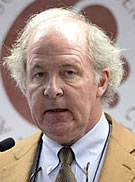Factor XI Antisense Oligonucleotide reduces the thrombosis risk without increased bleeding incidence
To determine whether decreasing factor XI (FXI) would effectively prevent venous thromboembolism (VTE) without increasing bleeding risk, a study presented during the 2014 ASH congress examined an injectable nucleic acid that was designed to reduce the FXI expression (Factor XI Antisense Oligonucleotide or FXI-ASO). This study is the first to show that FXI contributes to post-operative VTE and that lowering FXI levels is very effective for its prevention. Results that were presented show that the incidence of VTE detected by mandatory bilateral venography was reduced from 30.4% with enoxaparin to 4.2% with the 300 mg FXI-ASO regimen. Interestingly, while this novel treatment reduced the expression of FXI and the incidence of VTE, it did not increase the risk of bleeding and did not affect other components of coagulation.
Patients undergoing total knee replacement are at an increased risk of VTE. The pathogenesis of post-operative VTE is not yet completely understood, but tissue factor exposed at the surgical site is thought to be the major driver of this process through the extrinsic pathway of coagulation. Preliminary data suggest that reducing FXI, a central component in the intrinsic pathway of coagulation, might help to prevent clotting without causing extra bleeding, a typical complication associated with the current anticoagulation drugs. This theory is further supported by evidence that patients born with FXI deficiency have a reduced risk of VTE. FXI levels can be lowered using ISIS 416858 (FXI-ASO), an antisense oligonucleotide that specifically reduces human FXI mRNA expression in the liver. To determine whether lowering FXI levels prevents VTE without increasing the risk of bleeding, two doses of FXI-ASO were compared with enoxaparin in 300 patients undergoing total knee arthroplasty.
In the presented study, 300 patients were randomized to one of two FXI-ASO regimens (200 mg or 300 mg) or to 40 mg of the low molecular weight heparin enoxaparin, administered once daily. FXI-ASO was administered as 9 subcutaneous injections starting 36 days before surgery with the last dose given 3 days post-operatively. Enoxaparin was to be continued for at least 8 days post-operatively. The primary efficacy outcome of the trial was the incidence of VTE, detected by mandatory bilateral venography (performed on days 8 to 12 post-operatively) or by symptomatic events, while the principal safety outcome was major and clinically relevant non-major bleeding.
FXI-ASO prolonged the activated partial thromboplastin time in a dose-dependent manner, but had no effect on the prothrombin time. Around the time of surgery, mean FXI activities were 0.38 ± 0.01, 0.20 ± 0.01 and 0.93 ± 0.02 units/ml in patients given the 200 and 300 mg FXI-ASO regimens and enoxaparin, respectively. In contrast, levels of FXII, FIX and FVIII, other components of the intrinsic pathway, were unaffected by FXI-ASO. After surgery, patients receiving the higher dose of FXI-ASO were shown to have the lowest occurrence of VTE (4.2%, 3 of 71 patients) when compared to those receiving low-dose FXI-ASO (26.9%, 36 of 134 patients) or enoxaparin (30.4%, 21 of 69 patients). As such, the 200 mg regimen was non-inferior, while the 300 mg FXI-ASO regimen was superior to enoxaparin (p˂ 0.001) in the prevention of VTE. In addition to this, patients receiving FXI-ASO had fewer bleeding episodes than patients receiving enoxaparin (bleeding rate of 2.6% in the high-dose FXI-ASO group compared with 2.8% in the FXI-ASO low-dose group and 8.3% in the enoxaparin treated group). Pre-operative and post-operative hemoglobin values and transfusion requirements were similar in the three treatment groups.
In summary, this novel treatment lowers the expression of FXI and reduces the incidence of VTE, while it does not increase the risk of bleeding and does not affect other components of coagulation. Further confirmatory studies are needed to validate these results, but data of this study demonstrate that this new agent may be of significant value in the prevention and treatment of venous thrombosis.
Reference
Büller H, Bethune C, Bhanot S, et al. Factor XI Antisense Oligonucleotide for Prevention of Venous Thrombosis. Presented at ASH 2014; Abstract #LBA1.


